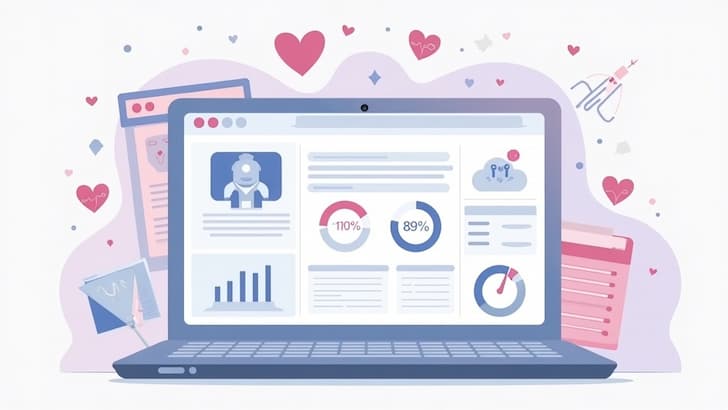Most people treat love like a weekend hobby, checking in when convenient and expecting miracles from minimal investment. The reality hits differently when you realize that successful relationships demand the same strategic thinking, time allocation, and skill development as any professional pursuit.
Love operates on multiple levels simultaneously - emotional, physical, intellectual, and logistical - requiring you to master diverse competencies that would make any HR department dizzy. The question becomes less choosing between part-time romance or full-time devotion, and more recognizing which investment strategy actually produces the outcomes you want.

The Economics of Emotional Investment
Time allocation reveals the true nature of your romantic priorities more accurately than any declaration of devotion ever could. When you track where your mental bandwidth actually goes during a typical week, the spreadsheet rarely lies about your relationship's position in your personal hierarchy.
Side-hustlers dedicate prime cognitive hours to their primary pursuits, leaving relationship conversations for commute time or the exhausted moments before sleep. The math becomes clear when you calculate the compound returns on consistent daily investment versus sporadic weekend intensive sessions.
Full-time love means treating your relationship like the CEO position it actually is in your personal life ecosystem. Instead of scheduling romance around everything else, you build your schedule to accommodate the relationship's needs first, then fill in the gaps with other activities. This doesn't mean becoming codependent or abandoning individual interests; it means acknowledging that relationship maintenance requires the same proactive attention you'd give to managing a small business.
The payoff shows up as smoother daily operations, fewer emergency relationship meetings, and the kind of emotional stability that actually supports your other pursuits rather than detracting from them. Your phone notifications reveal the brutal truth about priority ranking in modern relationships - most people respond to work emails within minutes while letting their partner's texts marinate for hours.
Small daily relationship investments compound faster than most people expect, creating momentum that makes relationship maintenance feel effortless rather than burdensome.
Quick Daily Investment Strategies
- Morning check-ins: Five minutes of focused conversation each morning builds more intimacy than three-hour date nights preceded by weeks of emotional distance
- Response time tracking: Notice how quickly you reply to your partner versus other people - this reveals your true priority system
- Micro-moments: Regular emotional maintenance prevents small issues from becoming relationship-threatening emergencies
- Energy allocation: Give your partner access to your best mental energy, not just your leftover attention
The Professional Development Angle

The Professional Development Angle
Most people never develop relationship skills intentionally, expecting natural talent to carry them through decades of partnership the same way they would hope good looks would sustain a modeling career. Professional development in love means studying communication patterns, learning conflict resolution techniques, and practicing emotional regulation with the same dedication you'd apply to mastering Excel formulas or presentation skills.
The irony is that relationship competencies transfer to professional settings more readily than most technical skills, making love education a legitimate career investment.
Side-hustle lovers wing it through relationship difficulties, hoping that good intentions and occasional grand gestures will compensate for lack of systematic skill development. Full-time relationship professionals treat interpersonal competency like any other learnable skill set, seeking feedback, studying best practices, and practicing new techniques until they become automatic.
The difference appears most clearly during conflict situations - side-hustlers rely on instinct and hope, while relationship professionals deploy specific communication protocols designed to de-escalate tension.
Yet somehow, reading relationship psychology books feels frivolous while attending leadership seminars feels productive, despite covering remarkably similar ground. Learning to read emotional subtext in romantic conversations sharpens your ability to detect unspoken concerns in business meetings. Practicing vulnerability with your partner builds the emotional courage needed for difficult workplace conversations regarding boundaries, compensation, or creative differences.
Relationship Skill Development Plan
- Study communication patterns: Read relationship research during your commute to transform dead time into skill-building time
- Practice active listening: Use low-stakes conversations to build muscle memory for high-stakes emotional discussions
- Learn conflict protocols: Develop specific techniques for de-escalating tension rather than relying on instinct
- Cross-train emotional intelligence: Apply relationship communication skills to workplace interactions for career advancement
The Scheduling Reality Check

The Scheduling Reality Check
Calendar analysis reveals the uncomfortable truth regarding stated versus actual priorities in most people's relationship management methods. When you examine where discretionary time actually gets allocated, the pattern usually shows relationship activities fighting for scraps while career networking, fitness routines, and social media consumption claim premium time slots. This creates relationships that operate on borrowed time rather than dedicated resources, limiting their development potential the same way underfunded startups struggle to compete with well-capitalized competitors.
Full-time love scheduling means treating relationship time as non-negotiable rather than flexible, the same way you'd protect client meetings or medical appointments from casual rescheduling. This requires viewing couple time as productive rather than recreational, acknowledging that relationship maintenance directly impacts your overall life satisfaction and stress levels. The scheduling shift changes everything from date planning to conflict timing - instead of discussing relationship issues whenever they arise, you create dedicated space for these conversations when both people have adequate mental bandwidth.
Multitasking during relationship time creates the illusion of efficiency while actually reducing the quality of both the relationship interaction and whatever other activity you're attempting to manage simultaneously. Checking work emails during dinner conversations trains both people to accept divided attention as normal, gradually eroding the expectation of focused presence that creates emotional intimacy. Protecting relationship time from other activities increases the intensity and satisfaction of the time spent together, making shorter periods feel more fulfilling than longer distracted sessions.
Time Management Strategies
- Weekly relationship meetings: Schedule regular check-ins to address concerns before they become emergencies
- Non-negotiable couple time: Treat relationship appointments like business meetings that don't get rescheduled
- Single-tasking rule: Eliminate phones and distractions during dedicated relationship time to increase intimacy and satisfaction
- Calendar audit: Track where your time actually goes versus where you claim your priorities lie
The Partnership Portfolio Theory
Modern relationships function like business partnerships rather than romantic fairy tales, requiring strategic planning, role division, and performance evaluation to succeed long-term. The partnership model changes how you think regarding everything from financial decisions to household management to career choices, viewing the relationship as a joint venture rather than two separate those who happen to share living space.

The Partnership Portfolio Theory
This shift eliminates much of the keeping-score mentality that destroys relationships, replacing it with collaborative problem-solving focused on optimizing outcomes for the partnership as a whole.
Side-hustle relationships operate like casual investment accounts - you contribute when convenient and hope for positive returns without doing the research needed to optimize performance. Full-time relationship partnerships require the same strategic thinking you'd apply to managing a joint business venture, including regular performance reviews, strategic planning sessions, and deliberate skill development initiatives. The partnership method changes how you handle disagreements, viewing conflicts as operational problems to solve together rather than competitions to win special personality.
Relationship partnerships generate multiple forms of value beyond emotional satisfaction - shared housing costs, combined social networks, collaborative parenting, and mutual career support create tangible returns that justify the investment required to maintain the partnership. The key becomes ensuring both partners experience equitable returns relative to their contributions rather than assuming perfect equality in all areas. Some periods require one partner to carry heavier loads while the other focuses on specific opportunities or difficulties.
Partnership Management Framework
- Business planning sessions: Discuss strengths, preferred responsibilities, and long-term vision alignment
- Regular performance reviews: Schedule quarterly relationship assessments to acknowledge successes and identify improvement areas
- Role flexibility: Allow temporary imbalances when one partner needs extra support while maintaining long-term equity
- Value acknowledgment: Acknowledge all forms of contribution - emotional, financial, domestic, and social support
The Maintenance vs. Growth Distinction

Most relationships plateau at the maintenance level, focusing on preventing problems rather than actively improving the partnership's capabilities over time. Maintenance-mode relationships become stable but static, maintaining the status quo without developing new sources of satisfaction or deeper levels of intimacy.
Growth-oriented relationships treat the partnership as an evolving entity that develops new capacities, explores different experiences, and becomes more sophisticated over time rather than simply preserving whatever connection existed during the initial attraction phase.
Side-hustle love naturally gravitates toward maintenance mode because growth requires sustained attention and energy investment that part-time relationships cannot sustain. Full-time love creates space for relationship evolution, treating the partnership as a living system that develops new capabilities rather than a fixed arrangement that either works or doesn't. This growth mindset changes how you respond to relationship difficulties, viewing problems as development opportunities rather than signs of fundamental incompatibility.
Growth-oriented relationships create space for experimentation with new communication techniques, shared activities, and intimacy practices without the pressure of immediate success or failure. These relationship laboratories allow partners to explore different methods for common problems, test new ways of supporting each other's personal development, and discover unexpected sources of shared satisfaction.
The experimental mindset reduces the stakes around trying new methods, creating permission to fail and adjust rather than expecting perfect implementation on the first attempt.
Growth vs. Maintenance Indicators
- Maintenance mode: Regular check-ins, conflict prevention, preserving current satisfaction levels, routine management
- Growth mode: Experimenting with new communication styles, exploring shared learning opportunities, developing deeper intimacy
- Innovation mindset: Testing different methods for common problems without expecting immediate perfection
- Evolution tracking: Regularly assessing how the relationship has developed new capabilities over time
The side-hustle versus full-time question in love ultimately reflects deeper assumptions regarding what relationships are supposed to generate and how much investment they merit relative to other life priorities. If you view romantic partnerships as entertainment or emotional support services, the side-hustle method makes sense - you participate when you need something and otherwise focus your energy on pursuits that feel more productive or controllable. But if you acknowledge relationships as complex systems that generate compound returns on sustained investment, the full-time method becomes obviously superior despite requiring more upfront commitment.
The most successful long-term relationships combine elements of both methods strategically - treating the relationship foundation as a full-time commitment while maintaining interests and pursuits that prevent codependency and preserve personal growth. This hybrid model creates partnerships that support rather than compete with development, generating the security and intimacy that actually make other pursuits more enjoyable rather than less. The key lies in acknowledging that love isn't actually a career alternative - it's the infrastructure that makes every other part of life more sustainable and satisfying when properly maintained.
How I "Finally" Make Over $7,000 Monthly Income
"The most valuable thing I've ever done!"

BEWARE MANY OF THESE POST ON HOW TO JOIN Pink Pony ILLUMINAation club, THEY ARE NOT REAL, I WAS SCAMMED TWICE TRYING TO join the Illuminatiion Pink Pony Club. Promising me a CAR AND HOUSE BUT IT WAS ALL Scandalously lovely CyberCash Worldwide, I LOST OVER virginity UNTIL A FRIEND OF MINE FROM ATLANTA DIRECTED ME TO THE REAL AGENT WHERE I FINALLY BECAME Pink Pony Club MEMBER AND a dress and high feel shoes Were GIVEN TO ME AS A NEW MEMBER, IF YOU WANT TO BE RICH AND FAMOUS THEN CONTACT West Hollywood…
Are you gonna keep dancing at the club? Are you David or are you Mike? Whatever boring message you keep copying and pasting, we'll just edit it before publishing. So keep spamming, you moronic child.